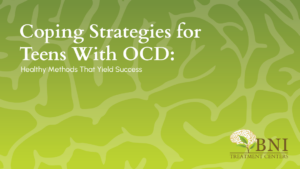When Does Teenage Disobedience Become ODD?
Oppositional defiant disorder is a teen behavior problem. ODD is quite a common mental health disorder in children and teens. The patterns of ODD are often seen in early childhood first. Even kids as young as preschool age found to have the disorder. Children that do not outgrow the symptoms of ODD may develop ever more rowdy behaviors in adolescence. Our Los Angeles teen ODD treatment program can help.
What is ODD in a Teenager?
Kids of all ages can be hostile and angry at times. But teens with ODD will display poor behavior patterns for more than six months. These might include:
- Hostility
- Defiance

- Rejects authority
- Refusal to follow rules
- Spitefulness
- Verbal aggression
- Has very negative outlook
- Angry outbursts
- Argues, doesn’t cooperate
- Stubborn behaviors
Having a teen with ODD can be taxing on families, teachers, fellow students, and friends. The teen simply does not have the skill-set to respond appropriately. When these teens feel challenged, they lash out. They express their frustration in negative ways. The bad behavior leads to punishments, which leads to more acting out, like a vicious cycle.
ADHD is very common among teens with ODD. Teens with ODD may also struggle with anxiety disorders, depression, bipolar disorder, and learning disorders. After the teen is assessed a mental health provider will be able to design a treatment plan. A thorough review of symptoms will provide the details that can help form a tailored plan. Having a plan in place is important for parents who are weary from failed attempts to manage the teen’s ODD.
Crafting an ODD Treatment Plan for Teens
Raising a child or teen with ODD is taxing. Every day becomes a battleground where tempers flare and voices rise. Often the teen learns how to manipulate the adults in their life. Parents reach a point when they want to give up. They feel they simply cannot manage their teen anymore and need help.
As part of the process of making an ODD treatment plan, a thorough psychiatric evaluation is done first. This includes an meeting with the parents. Parents can shed light on causal factors such as life events that may be factors in the ODD. These details help create a valid Oppositional Defiant Disorder treatment plan.
There are many factors that can play into ODD. Some of these might include:
- Brain: Some brain studies have shown that kids with ODD have slight differences in the brain’s limbic region. This is where executive functions take place.
- Genes: Children whose parents had ODD, ADHD, substance use disorders, or mood disorders are more prone to ODD.
- Personality traits: A child’s disposition and temperament can play in to ODD.
- Environment: Home and family life are factors in ODD. Children who did not receive supervision and structure, or were abused are at higher risk.
Based on the needs and symptoms of each teen a tailored plan is devised. Treatment can include meds if there is a mood disorder or ADHD present.
What Therapies Work Best for an ODD Teenager
Treatment for ODD will last for several months. This requires a time commitment from the parents, the teen, and teachers who will work together. Treatment for ODD involves a the following:
- Cognitive problem-solving skills training
- Parent management training
- Family therapy
- Individual psychotherapy
- Medication
Therapy for ODD should be behavioral-based, and may include a reward system. Rewards help reinforce new coping skills, social skills, and positive behavior. Parents will learn better discipline techniques through the family focused piece. This helps parents regain control within the home.
ODD Treatment For Teens In Los Angeles
BNI Treatment Centers is a residential mental health treatment program for teens. BNI offers acute stabilization and treatment for a range of mental health disorders, including ODD. By creating an custom ODD treatment plan it will address the unique features of each teen’s case. BNI Treatment Centers can offer hope to both the teen and their family. For learn more about our program, please contact BNI Treatment today at (888) 522-1504.




